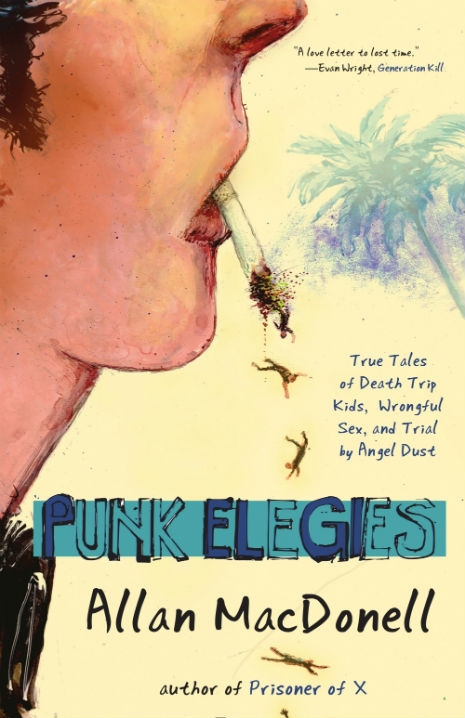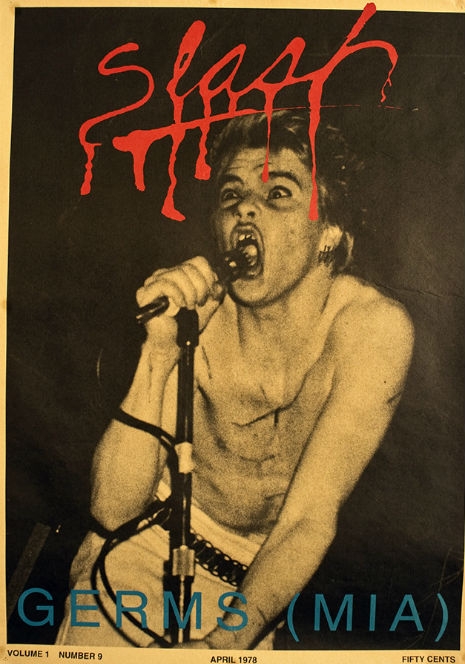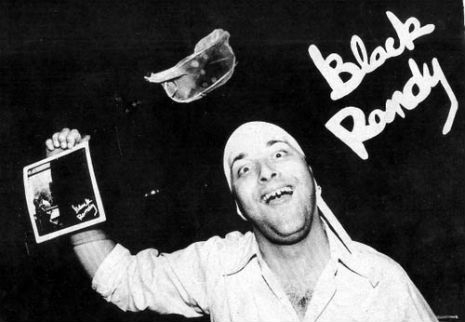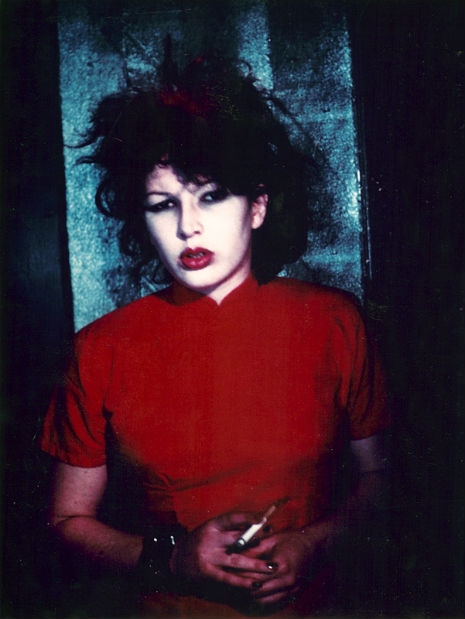
Memoir is a smooth sounding word that can often deliver either salacious insight or NPR-friendly whisper-soft introspection. In the hands of a writer like Allan MacDonell, you will get something that flirts with both approaches and yet ultimately is something entirely its own creation. Hence, you get a gem like Punk Elegies in your hot little hands. MacDonell, whose resume boasts writing for the seminal early punk zine, Slash to being a renaissance man/editor at Hustler, an experience that he documented in his excellent 2006 book, Prisoner of X: 20 Years in the Hole at Hustler.
While a number of books and films have been made about various players and aspects of the late 1970’s west coast punk scene, Punk Elegies stands out from the herd. There’s the obvious draw of having the writer/narrator being someone who was there and survived to tell the tale. That’s a given, but MacDonell’s approach, always intelligent, solidly articulate and ballsy enough to paint himself in the most unflattering colors, is the true sturm und drang to snag you and keep it fresh in your mind long after you finished the last page. Klaus Kinski once said that “Virtues can be faked. Depravity is real.” Mercifully for the author, MacDonell’s journey never quite gets to red-level-Kinski’s, but the quote still fits. Nobody comes off worse than the man himself.

Punk Elegies also features key peeks into the short-lived but still legendary punk scene in Los Angeles in the late 1970’s. Artists ranging from X to The Screamers to The Go-Go’s to Black Randy & the Metrosquad and more all pop up throughout the tome. All of this adds up to a beautifully written book that is one part punk culture and all parts gut-throat memoir. Allan MacDonell was nice enough to agree to some questions regarding Punk Elegies.
How was it revisiting this part of your life for Punk Elegies? Was it pure reflection or part-exorcism?
First off, there’s not a lot of purity in anything I’ve done, but reflection is one of my great gifts, like it is with any self-loving, self-lacerating narcissist. Long stretches of pond-staring went into mapping out Punk Elegies. I tried to clarify, for myself, what I’d been up to with all this baffling behavior. Unfortunately, none of my demons were exorcised. They’ve all made themselves more at home.
What does LA feel like for you now? Is it still a vibrant hub of artists and misfits or more like a city of ghosts?
For me, L.A. now feels like it’s being overrun by a massive influx of real-estate refugees from Manhattan and Brooklyn. The hilarious rise in cost of housing, the absence of available parking, the increasingly ill-mannered gamesmanship on the locked traffic grid, these are a few surface indications of a deep metaphysical congestion in this city that has choked off the ghosts. I still like it here. They haven’t squeezed me out yet.
Have you gotten any feedback from anyone who was in your inner circle during the time period of Punk Elegies?
Most of the feedback I’ve received has come in the form of silence. Germs drummer Don Bolles, who plays a role in Punk Elegies, gave the book a video endorsement. I only had to pressure Don slightly. The original keyboard player for the Screamers left a nine-paragraph elegy of his own in the comments of a Punk Elegies playlist I put together for Decibel.
Are you still in touch with your first wife, Tommie, who is hugely prominent figure throughout the book?
I’m still in touch with practically no one who is depicted in this book. Inspirational kitten memes tell me there’s no point in wishing things were different, but sometimes I do.

There are a lot of great stories about Black Randy in Punk Elegies. It’s a safe statement to say that there really was no one like him back then or even now. In a just world, he would have all the cult appeal and fandom of, say Sid Vicious or Darby Crash. What is your take now on the legacy of Randy?
I do presume to speak through Black Randy a lot in Punk Elegies, but I wish he were around to answer this one himself. Somehow, I suspect he would object to being grouped with Sid Vicious and Darby Crash. I’m pretty sure he and Darby liked one another—Darby sang in the Metro Squad chorus at one of Randy’s live shows. But Randy operated in a separate category that included him and almost no one else. He had an acute disdain for herd mentality and smug groupthink and Halloween rebels and for self-proclaimed mavericks living out on the copy-and-paste cutting edge. In the decades since he’s been gone, it seems that fewer and fewer of these teachings of Randy are being passed down and honored. In that sense, it’s like his entire legacy is a vanishing ideal.
What was the biggest motivation for writing Punk Elegies?
My primary urge as a writer is to impose my point of view upon as many impressionable minds as possible. Beyond that, I’ve just begun sorting through my mixed and ill-defined motivations for Punk Elegies. I was asking myself the other day: “What possible benefit did you think might come to you from this effort?” I don’t know what to tell us about that.

One of the many interesting aspects of your book is the peek it gives the readers into some of the talented but often overlooked artists of the late ’70s punk scene, like Black Randy, The Mau Maus, The Screamers and the latter’s occasional collaborator, Sheela Edwards. In the book, you allude to the Rene Daalder (who also made the brilliant Massacre at Central High) film she was in, Population One. Did you ever get to see it? Also, did ever hear from Sheela post-1980?
A few years ago, I was trolling away on Google search, and I saw Sheela on YouTube in Population One. I think the movie was split into six parts, and I watched all of them. Even better, there’s a video from 1979 of Sheela performing “I Wanna Hurt” live with the Screamers at the Roxy in Hollywood. In person, she was more powerful than either of these artifacts. Still, I’m thankful for the Internet.
You did not have the best experience writing for Slash magazine, especially regarding them not paying you for your work. Was this symptomatic of writing for them in general?
The book treats Slash magazine’s founders in an offhand way, but the people at Slash were very supportive of me. They published my writing. No one else did. They were open to any new story type I wanted to try, and they allowed me to masquerade behind ten different pen names. That magazine was instrumental in attracting the arty young trendies who defined the initial scene. Slash created the impression that something you really wanted to be a part of was happening in the alleys of Hollywood, created that impression well before anything was happening there. The Masque—an actual physical location where bands could play—was maybe the one thing more essential to the inception of L.A. punk than Slash magazine. That said, it’s still true that they refused my ultimatum demanding $25 pay per month. So I quit, which is one of my signature talents.
The opening paragraph to the chapter for “Sleepovers” is one of the most real and articulately raw lines in recent memoir history. The writer that can be brutally honest about their flaws without dipping into romanticism is rare. (After all, virtues can be faked, but flaws are real.) Was this a premeditated approach or intrinsically organic?
That section is my way of putting lames on notice that I understand the piss-ass nature of what I am revealing about myself here. I’m not under any delusion that I’m bragging. Conversely, I don’t have some blind spot hiding the fact that I am no more or less pitiable than any other fucker who might flip through these pages. As for premeditated versus organic, these stories went through five or six variations in my mind and on paper during the past 30-plus years. The final manuscript survived four to five stages of rewrites and edits. So most of the paragraphs that ended up published had been meditated upon fairly heavily. Still, I feel those paragraphs arrived at their final state in an organic way.
So, as you see here, I’m a guy who will claim the high road and the low road in the same breath.
Speaking of honest, two elements that get touched upon throughout the book are the bleakness of the mainstream musical landscape in the late ’70s (IE. AOR butt rock) and how quickly the punk scene got sullied and co-opted by both the mainstream and ex-jock meat heads masquerading as “hardcore.” Do you feel like other books and films (especially the Darby Crash biopic, What We Do Is Secret) have accurately captured the latter?
I loved the Feral House book Lexicon Devil, but I can’t comment on how the hardcore influx has been depicted elsewhere. Today, I know a lot of people who are 10 to fifteen years younger than me who have a punk past that informs who they are now. That second surge of body-slamming fans, and the music that served it, has meaning for these friends. I shouldn’t complain. I was finished with the whole setup before that next round of kids poured in. The illusion I’d been attracted to had crapped out by 1979. These hardy new brats showed up and claimed the void. I salute them.
Punk Elegies ends on a melancholy yet quietly hopeful open note. You have already written about your post-PE time line with the excellent Prisoner of X. Are there any plans to write a third book detailing either your post-Hustler period or pre-Punk Elegies childhood? (The latter’s excellent prologue feels like a potential peek into what that could be like.)
I completed a manuscript for a third book while Punk Elegies was being prepared by Rare Bird Books. This next book is called Now That I’m Gone, and it’s a memoir from beyond recall. This next volume depicts the events of my life after I’ve left my life. You see what goes wrong at my funeral and how closure plays out for my wife and my dogs. You hear people speaking ill of the dead, and you witness all the chicanery around the dispersal of my material goods and the farce that accompanies the scattering of my ashes. Events from my childhood and teens and on up through my forties and fifties flow through the chapters where my life passes before my eyes, and where I list the things I will and will not miss about this life and I recount my five enduring regrets and the legacy of my work. Two chapters take place in death, one in an afterlife I dread and the other in an afterlife I could live with This next book is really, really funny.